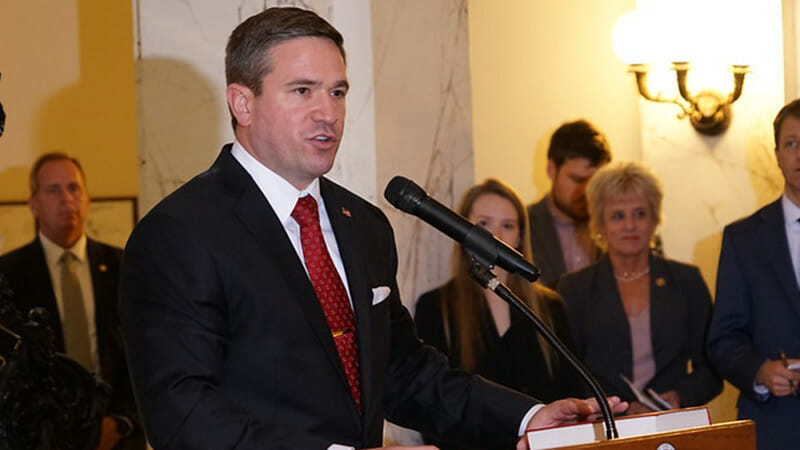American Gaming Association Blasts Missouri Attorney General Over Grey Area Slot Games

The American Gaming Association (AGA) President and CEO Bill Miller is not happy with Missouri Attorney General Andrew Bailey (pictured). That’s because the AG has recused himself from defending the state against a lawsuit filed by a slots-like game provider.
Torch Electronics makes what it calls “no-chance games.” They look and feel like slot machines, except they display the outcome of the next spin before a wager is placed. Players may decide to push through losing bets in order to hit a potential jackpot or bigger prize.
The company claims this makes them legal under Missouri law.
The developer and Warrenton Oil, a gas station and convenience store chain that hosts Torch’s games, are suing various Missouri state bodies for harassment and intimidation.
Bailey withdrew himself from dealing with the lawsuit because of an unspecified conflict of interest. Now, Missouri has to hire third-party lawyers to defend them in court.
“Our office followed our longstanding practice of retaining conflict counsel to avoid any appearance of impropriety,” said Madeline Sieren, a spokeswoman for the Attorney General’s office.
But Bailey’s detractors, including Miller and the AGA, want more answers.
“Either he fails to understand the severity of the problem, or — more likely — he is letting campaign donations from special interests get in the way,” Miller said in an op-ed piece for the St Louis Post Dispatch.
Operating Outside the Law
Miller says the slot-like games developed by Torch Electronics and others are “predatory devices.”
Whereas licensed casino slot machines and online slots are regulated by third party accreditors and other agencies, these slots-like games have no legal oversight. Miller says that AGA research shows they keep as much as 4x more of players bets than slots machines. And if they do pay out more, the operator can simply refuse to cough up the winnings.
Miller can point to several lawsuits that have been filed against Torch Electronics for nonpayment over the past few years as evidence to back his claims.
One case mentions “corruption and racketeering” in court filings. Another was filed by a legal gaming operator that says the slot-like machines unfairly compete with their licensed games.
Then there’s the fact these unregulated machines don’t contribute to state taxes. That’s compared to legal gambling operators in the state, who hand over more than $458 million a year in taxes to Missouri.
The issue is also a problem nationally. In Florida, officials have recently teamed up with retired persons association AARP to educate the state’s senior citizens on the legality of these type of games.
“In total, this costs states nearly $9 billion in taxes annually — money needed money for education, public safety programs, veterans’ programs and more,” said Miller in his opinion piece.
Exceeding Authority
Meanwhile, Torch Electronics disagrees with the AGA President’s assessment.
It claims the Missouri Department of Public Safety, the Missouri State Highway Patrol, and the Missouri Division of Alcohol and Tobacco Control have unlawfully “threatened to remove Torch devices based solely on their own incorrect interpretations of Missouri gambling laws,” the lawsuit said.
Until a precedent is set in a completed court case judgement, it can be difficult for states to nail down the letter of the law.
Torch’s lawsuit against Missouri agencies wants a judge’s ruling – but on their side.
“Judicial intervention is necessary to prevent the department and the highway patrol from exceeding their authority by continuing to remove Torch amusement devices from convenience stores,” the lawsuit said.
Grey area operators often settle out of court when it comes to lawsuits, so they can continue to plausibly deny breaking any laws.
Such as in the recent $419 million settlement paid out by social casino DoubleDown and its former owners, IGT.
The AGA and Miller, though, are in no mood to back down on the issue
“Missouri can be a leader in helping eliminate these machines. Attorney General Bailey needs to do his job, and in the absence of his action, the state legislature and law enforcement must fight back,” his letter finished. “With a unified effort, Missouri can ensure these machines no longer take advantage of its residents or communities.”











